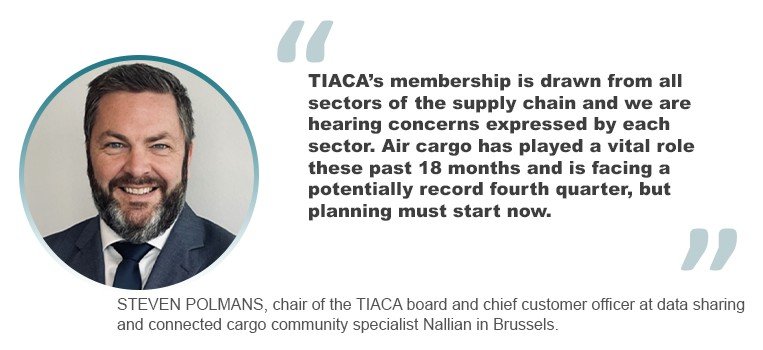The International Air Cargo Association (TIACA) has issued a dire warning to the aviation industry citing “unprecedented challenges” in the coming fourth quarter amid an expected surge in demand for air cargo services on the back of continuing capacity constraints and other disruptions to the supply chain.
TIACA, which represents all segments of the air cargo industry worldwide, said aside from “relentless pressure” that the industry faced at the height of the pandemic with high demand for personal protection equipment, vaccines, perishables and other critical cargo as well as a boom in e-commerce shipments as economies went into lockdowns then reopened, there were also challenges in terms of the ever-changing Covid-19 rules for personnel that impacted air cargo operations.
“The maritime industry is facing its own issues with ever growing port congestion, hinterland transfer delays, blank sailings and rising costs of shipping,” TIACA said in a statement, adding that many shippers, faced with such challenges to traditional supply chains, are exploring air cargo to ensure customer demands can be met.
“As we head towards the fourth quarter and the growing number of annual on-line shopping events, the stress on the system is expected to grow substantially,” the Miami-based association said.
“With states, particularly China, introducing a growing number of Covid-related worker restrictions which are unlikely to be lifted in the near future, the industry is urged to commence preparations urgently,” it added.
TIACA noted that these Covid-19 restrictions are “causing cargo to be dispersed across neighboring countries and airports, causing further challenges” – telling shippers to secure required capacity “as early in the cycle as possible.”
The association, which represents shippers, forwarders, ground handlers, airports, airlines, manufacturers and IT providers, also urged governments to assist the industry in fast-tracking necessary paperwork to hasten the movement of cargo ahead of the peak season rush.
“Governments are urged to fast-track ad hoc charter permits and consider supporting seventh freedom regimes where they are being implemented. States are also urged to work with industry representatives to identify in advance potential system blockages in order for them to be addressed before they further impact supply chains,” it added. “Supply chain disruptions are already being experienced in certain markets and the situation is projected to worsen,” TIACA warned.
Seventh freedom rights allow Country A’s aircraft to fly between Country B and Country C without stopping in Country A.
With international passenger demand still significantly below pre-Covid levels, the organization also noted that global connectivity – which air cargo traditionally relied upon for around 45% of total capacity – continues to be dramatically reduced.
Meanwhile, it said buoyant domestic demand in some key markets has resulted in some aircraft previously dedicated to cargo only operations being reassigned to address domestic passenger needs.
TIACA said this “will create further operational challenges” with freighter networks currently operating at unprecedented levels of efficiency, utilization and optimization.
The association also said supply chain players should adopt efficiency tools such as enhanced data sharing as a “matter of urgency,” adding that contingency plans must be established to deal with all eventualities that may arise.
“TIACA’s membership is drawn from all sectors of the supply chain and we are hearing concerns expressed by each sector,” said Steven Polmans, chair of the TIACA board and chief customer officer at data sharing and connected cargo community specialist Nallian in Brussels.
“Air cargo has played a vital role these past 18 months and is facing a potentially record fourth quarter, but planning must start now. Resourcing and capacity will be issues, handling and facility space will be an issue, delivery and drivers will be an issue,” he added.



